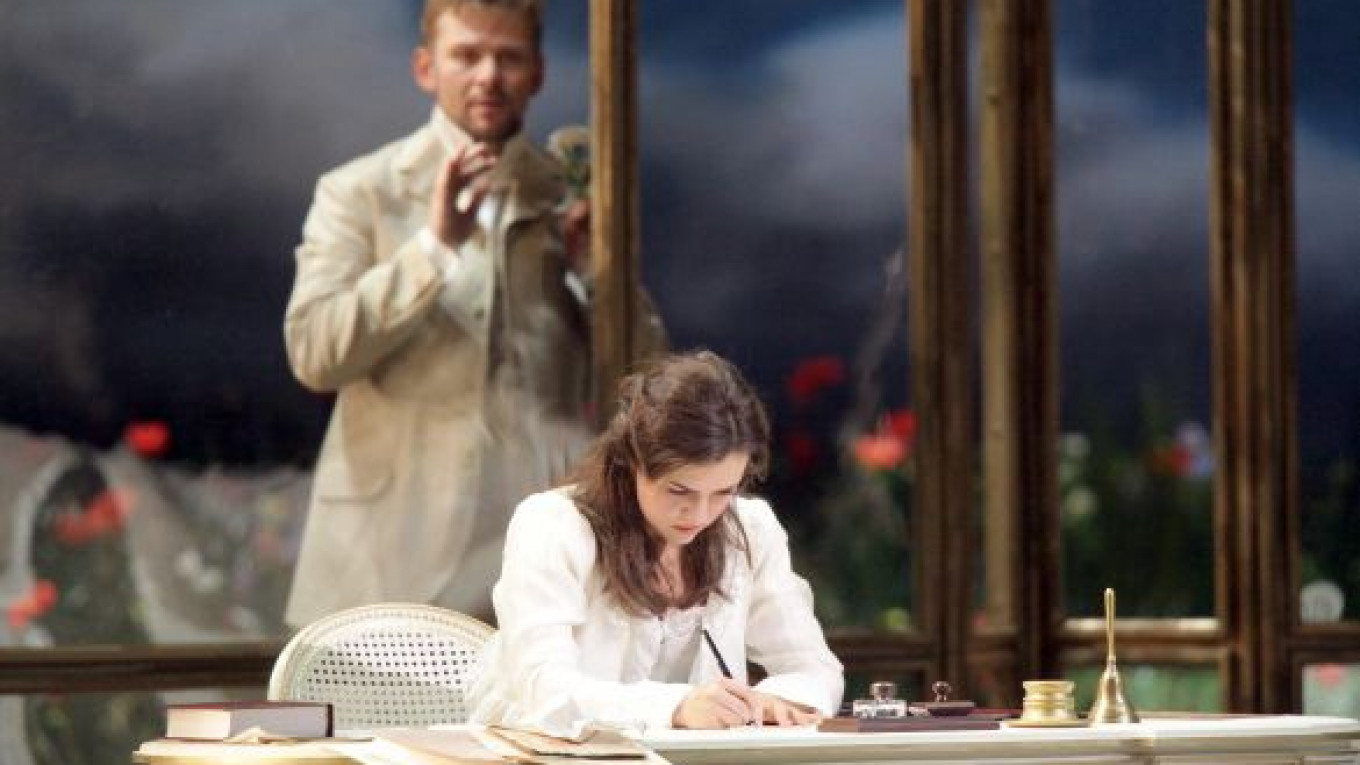Giuseppe Verdi's immensely popular opera "La traviata" returned to the Bolshoi Theater last month, following an absence of 12 years, in a very successful new staging by American director Francesca Zambello.
Zambello, whose previous productions at Bolshoi, Giacomo Puccini's "Turandot" and Sergei Prokofiev's "The Fiery Angel," remain among the most worthwhile to be found in the theater's operatic repertoire, set out to tell the story of "La traviata" through the eyes of Violetta, the "fallen woman" of the opera's title. The director's principal means of pursuing the idea seemed to be that of placing the dying courtesan in a hospital ward during the prelude to Act I and returning her there for her lengthy solo scene at the end of that act and for all of Act III, in which Violetta finally expires. I can't truly say that Zambello reached her objective. But by the second of the three performances I attended, I found the hospital scenes at least doing no harm to an otherwise very well-conceived and colorful staging, set in Paris at the turn of the 20th century.
As with her previous Bolshoi productions, Zambello seemed to stretch both the principals and members of the chorus to the very limits of their acting abilities, which proved quite adequate in most cases. The two ballroom scenes were suitably swirling and boisterous, and a fair amount of well-motivated action was devised to enliven the long and usually static Act II scene between Violetta and Giorgio Germont, the father of her lover, Alfredo.
In its overall effect, Zambello's "La traviata" amounts to a much-needed shot in the arm for the Bolshoi's meager and, apart from "Turandot," rather drab and time-worn repertoire of Italian opera.
The Bolshoi cast its new "La traviata" entirely with Russian singers. Of the seven who appeared in October in the opera's three principal roles, I was able to hear six.
The role of Giorgio Germont was beautifully sung, in true Verdian style, and played with conviction by both of the two baritones borrowed from Novaya Opera, Vasily Ladyuk and Igor Golovatenko. Of the two Alfredos, Yevgeny Nagovitsyn, a tenor drawn from the Bolshoi's Young Artists Program, compensated for a certain awkwardness on stage with a vocal quality and style that sounded truly Italian. His counterpart, Alexei Dolgov, a recent addition to the Bolshoi company, proved a more successful actor and displayed a clean, clear tenor voice, though one that lacked the warmth I recall hearing in it during his seasons not long ago at the Stanislavsky and Nemirovich-Danchenko Musical Theater.
The principal vocal attraction of the October performances was the appearance as Violetta of soprano Albina Shagimuratova, who, since taking a first prize at the 2007 Tchaikovsky Competition, has gone on to receive considerable acclaim both as a guest artist of the Bolshoi and on major operatic stages of Europe and the Americas.
Falling ill just before opening night, Shagimuratova was replaced at the premiere by Venera Gimadiyeva, a graduate of the St. Petersburg Conservatory and the Bolshoi's Young Artists Program, who joined the Bolshoi company last year. At the two performances of hers I attended, I found Gimadiyeva a major revelation.
Both in appearance and manner on stage, Gimadiyeva proved thoroughly believable as the doomed courtesan. Vocally, like most sopranos, she showed signs of strain in the high-lying music of Violetta's quarter-hour solo scene in Act I, but what followed afterward was an almost flawlessly sung and extraordinarily touching performance. Absolutely unforgettable was the perfectly focused pianissimo she produced in Act II on the passage beginning "Dite alla giovine," in which Violetta begs Giorgio Germont to tell Alfredo's sister of her sacrifice in renouncing Alfredo to avoid harming the sister's prospects for marriage. Some further magic occurred just a few minutes later, when Gimadiyeva's voice soared above the most thunderous passage in the opera's entire orchestral score as she uttered Violetta's heartbroken cry "Amami, Alfredo, quant'io t'amo … Addio" (Love me, Alfredo, as I love you … Farewell).
By contrast, Shagimuratova, heard at the last of October's nine performances, acted in fairly conventional operatic fashion. And perhaps she was having an off night vocally, for though she is undoubtedly blessed with remarkable talent, her singing lacked the pathos heard in Gimadiyeva's account of Violetta, some of her phrasing seemed unpolished and the various registers of her voice somehow failed to come together as a coherent whole.
French conductor Laurent Campellone led the score with great sensitivity, dealt attentively with the singers on stage and drew unusually polished playing from the Bolshoi orchestra.
"La traviata" (Traviata) plays Dec. 16 and 22 and Jan. 13 at 6 p.m. and Dec. 18, 19 and 20 and Jan. 9, 10, 11 and 12 at 7 p.m. Bolshoi Theater, main stage. 1 Teatralnaya Ploshchad. Metro Teatralnaya. Tel. (495) 455-5555. .
Related articles:
A Message from The Moscow Times:
Dear readers,
We are facing unprecedented challenges. Russia's Prosecutor General's Office has designated The Moscow Times as an "undesirable" organization, criminalizing our work and putting our staff at risk of prosecution. This follows our earlier unjust labeling as a "foreign agent."
These actions are direct attempts to silence independent journalism in Russia. The authorities claim our work "discredits the decisions of the Russian leadership." We see things differently: we strive to provide accurate, unbiased reporting on Russia.
We, the journalists of The Moscow Times, refuse to be silenced. But to continue our work, we need your help.
Your support, no matter how small, makes a world of difference. If you can, please support us monthly starting from just $2. It's quick to set up, and every contribution makes a significant impact.
By supporting The Moscow Times, you're defending open, independent journalism in the face of repression. Thank you for standing with us.
Remind me later.






